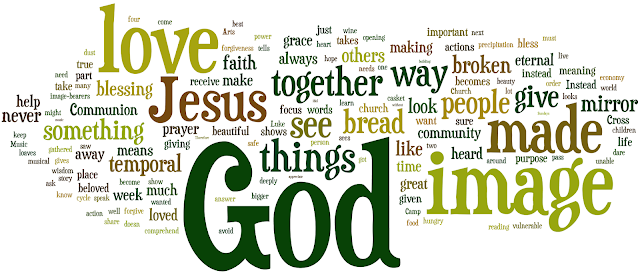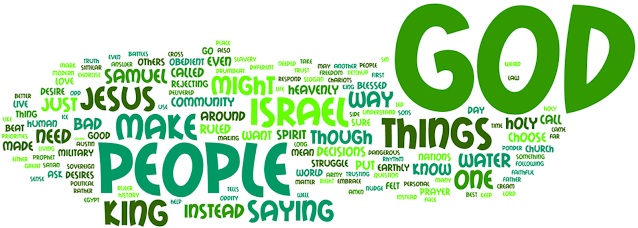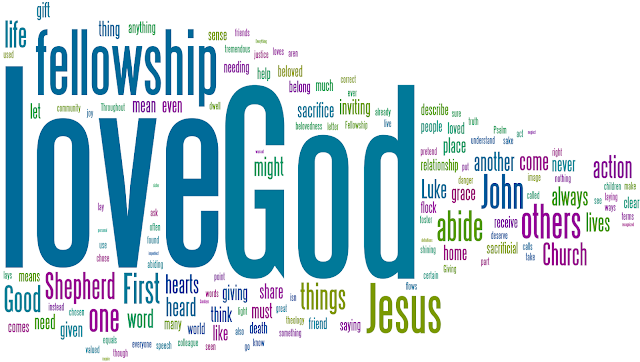Help us, O Lord, to embrace the blessed oddity of
trusting you. Amen.
One
of the most dangerous phrases is “people are saying.” It’s usually a precursor
to making a bad decision – people are saying that the IRS doesn’t really do
audits, so it’s okay to not report all of your income; people are saying all of
your friends are doing it, so you can too; people are saying that ketchup on
ice cream is pretty good. Even if people say those things, none of them leads to
anything good. And I made up that one about ketchup and ice cream, so please
don’t try it.
Appealing
to the logic of the faceless majority is a dangerous thing that tempts us into
doing things we would otherwise know to avoid. It appeals to our sense of belonging
– which isn’t a bad thing. Belonging to a community is a healthy part of what
it means to be human. But, just as our parents warned us, just because everyone
else is doing it doesn’t mean that we should be. This is the wisdom that we
encounter in both 1 Samuel and Mark this morning.
In
First Samuel, we hear about the transition from being the people of God to the
Kingdom of Israel. After the Hebrew people were liberated by God from slavery
in Egypt, they spent a generation traveling to the Promised Land of Israel.
Along the way, they were led, but not ruled, by Moses and then Joshua. When
they arrived and settled in the land, they were what we might call a theocracy.
When conflicts arose, judges discerned about best to apply God’s law. When a
military was needed to defend themselves, one was assembled. To be clear, it
wasn’t a perfect system, far from it. Just read the book of Judges and that
will become obvious. But the people of Israel did not have a king, for God was
their sovereign.
Samuel
was a prophet and a judge, but his sons were not up to the task of providing
further Godly leadership. As Israel looked to the north and the south, the east
and the west, they saw themselves surrounded by kingdoms – nations ruled by a
monarch. “People are saying that a kingdom is a great way to live,” they protested.
So Samuel did what a good leader does – he went to God in prayer and listened.
And
though it’s not what God would have chosen for us, God grants us the freedom to
make bad decisions. Bad decisions are something that we humans specialize in. So
God told Samuel, “They’re not rejecting you, but rather me. Give them the king
they are asking for, but make sure they understand what this will mean.” God knows
us better than we know ourselves. As we so often pray, to God all hearts are
open, all desires are known, and no secrets are hid. Even though God had
brought the people out of slavery, even though God had provided water and bread
in the wilderness, even though God had been with them in their battles, even
though God had given them the Torah to guide their common life, and even though
God remained faithful to the people, the people did not remain faithful to God.
God might lament the people’s fickle desires for a human ruler instead of a
heavenly one, but God is not surprised by this particular manifestation of sin.
Instead
of just saying “Fine, have it your way,” God first warns the people what this
will mean. A king will take your sons and conscript them into the army; he will
use the military not just for national defense, but personal gain; he will put
your daughters into service in his palace; he will take the best of your lands with
the law of eminent domain; he will impose unnecessary taxes on you. And you
will not have a vote or a say in the matter. They respond by that people are
saying it won’t be that bad – “No! but we are determined to have a king over
us, so that we may be like other nations, that a king may govern us and go out
before us and fight our battles.”
Israel
did not need a king for geo-political reasons, they did not need a legislator-in-chief,
they did not need a better-organized military. Not at all. They asked for a king
not because they needed one, but because they wanted one. Maybe they were
jealous of other nations, perhaps it was their inability to be content with
what they had and their desire to see if the grass was greener on the other
side, it could be that they felt insecure with a heavenly ruler instead of an
earthly one, we can’t know for sure where this desire for a king came from, but
they are desires that we struggle with as well.
Some
struggle with being happy with what they have, so they have Amazon deliver
something every day, or they have extra-marital relationships, or they
constantly criticize others to feel better about themselves. Living in our
modern world, we all struggle with living in what we can call a “disenchanted
world,” a world in which God is optional. Two weeks ago, I was in the Vatican and
there was a large stoop, a holy water receptacle, near the entrance. It contained
water that had been blessed by the Pope. So, I made sure to put some water on
my fingers and made the sign of the cross. Earlier that day, I had also passed
by the lovely Trevi Fountain in Rome, but I felt no such desire to use that
water in the shape of a cross. Many would say “Either way, it’s just water.”
Indeed, we are tempted by
our modern way of thinking to push God off to the side, to think that faith is
a private matter, to relegate religion to the realm of opinions and hobbies. So
when we make political, financial, and personal decisions, we want autonomy –
we want to be the one who decides what is right for me, instead of being under
the jurisdiction of God or the community of the Church. For Israel, a king with
a crown and a throne was visible – and would be someone the people could overthrow,
if they choose to do so. No so with God. Being ruled by God requires greater
persistence and trust, and while God can be ignored, God cannot be overthrown.
We ought not to condemn the people of Israel for making the same decisions we
make on a daily basis. We prefer instant gratification to patient endurance, we
like things we can explain and understand more than mystery, we want to be in
control more than we want to be obedient. Like Israel, we choose things earthly
over things heavenly.
Unsurprisingly,
God was right about what would happen. The monarchy would eventually lead to the
downfall and destruction of Israel. The prophet Ezekiel would later write about
the kings of Israel, comparing them to bad shepherds who slaughter the flock
instead of protecting them. Israel will amass a great army, made up of many
chariots. Chariots, you will remember, were the very vehicles that pursued them
through their escape from Egypt. It was at the Red Sea that God delivered the
people from chariots, and here they are, becoming the very thing they had escaped
from. In being ruled by a king instead of God, the people lost their identity
and their freedom. Living under the rule of anyone other than the God of life
and love isn’t just idolatry, it is to choose the way of death. Especially in
an election year, it’s worth reminding ourselves that no candidate, no party,
and no political solution will ever bring about salvation or utopia. Either we
trust that God is enough, or we are led astray by false messiahs.
A
similar choice is in front of the people of Nazareth. Here they are, face to
face with the God of Israel in Jesus. But he isn’t conforming to their expectations.
And so they dismiss him saying, “He’s out of his mind.” Others go so far as to
say that he is demon-possessed. In First Samuel, the people rejected God by
choosing a human king. Here in Mark, the people are rejecting God by putting
the Messiah into a box.
Jesus
lived with a different gravitational center than those around him. For Jesus,
God was clearly his Father. And I’m not so much speaking about biology here
because God is the Father and Mother of us all. Jesus did not have a Caesar or
a King that he was obedient to, rather he was obedient to his father who art in
heaven, to his eternal mother from whose womb of love he came. We might say
that Jesus marched to the beat of a different drum, which put him out of step with
those around him. Martin Luther King once delivered a sermon called “The Drum Major
Instinct,” in which he has us question the beat and tempo by which we live. Do
we live for ourselves or for others? Do we make up our own beat, or do we
listen for and follow God’s holy rhythm?
When
the voice of the Holy Spirit speaks to us as our conscience, do we call it a
holy nudge or indigestion? This is what Jesus is getting at when he tells us
about blaspheming against the Holy Spirit. Rejecting God as our sovereign is
the same sin as rejecting the Spirit’s guidance. And when through the Church
the Spirit tells us what behaviors are acceptable and which are not, how do we
respond? Many say “That’s paternalistic, you can’t tell me what to do.” To be
fair, the Church does have a long and sad history of manipulation and
paternalism, but it also has a long and holy history of being a moral compass,
a beloved community, a place of boundaries, a hospital for the sick, and a place
for humble repentance. Our culture is infatuated with the idea of “finding your
own path” and “you do you” to the point that we have little room left for
listening to the drumbeat of God’s love and following instead of trying to be an
influencer. I can only answer these questions for myself, and I invite you to
ponder them this week.
The
rebuttal that Jesus offers to those who say he is possessed is exorcism. Jesus asks
“How can Satan cast out Satan?” The answer is that it doesn’t work that way. We
can’t replace one addiction or idol with another. Instead, we ask Jesus to
exorcise and remove from us the things that need to come out. It’s a tough
question to ponder, but what are the things that God might ask of us that would
make us say “I can’t do that”?
What if God called us to give
some of our endowment to another church in town that is struggling to make ends
meet? What if God called you to increase your giving to St. Luke’s by 25%? What
if you felt a nudge to exchange time on Instagram or Netflix for time reading
Scripture? What if you took a day off a month to go on a prayer retreat? What
if you reached out to that person you’re estranged from? Now, if our response
to these sorts of things is “But I can’t do that,” then we might need to
consider what needs to be exorcised from us. A sense of fear around money, our
need to be correct, our unwillingness to ask for help, our workaholism?
We all have things that prevent
us from hearing and following the drumbeat of God’s holy rhythm, things that make
us say “I can’t” to the call of God, things that make us choose earthly
priorities and masters over heavenly grace. Through prayer and with community,
Jesus will exorcise those things from us when we are honest about our captivity
to them and name them as the idols that they are. And this will make us odd. We
will not have the same priorities as others around us. People might say
negative things about us, but why should we care what people are saying? We
might be called “out of our minds,” or worse.
You might know that the unofficial
slogan of the city of Austin, Texas is “Keep Austin Weird.” We would do well to
adopt a similar slogan – “Keep Christianity Weird.” Or as the author Flannery O’Connor
put it, “You shall know the truth, and the truth shall make you odd.” Help us,
O Lord, to embrace the blessed oddity of trusting you. Amen.







































